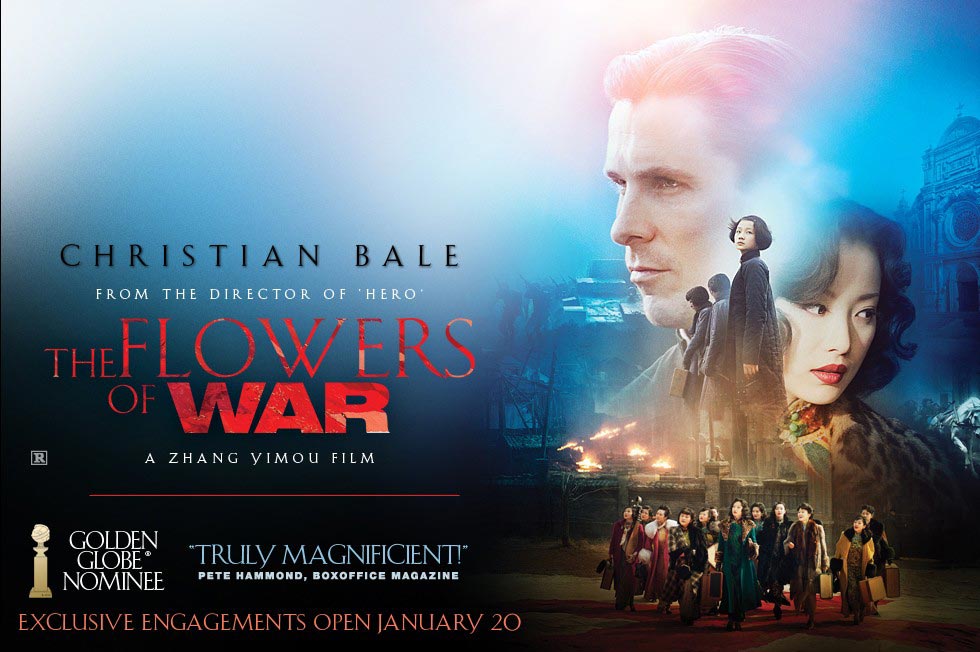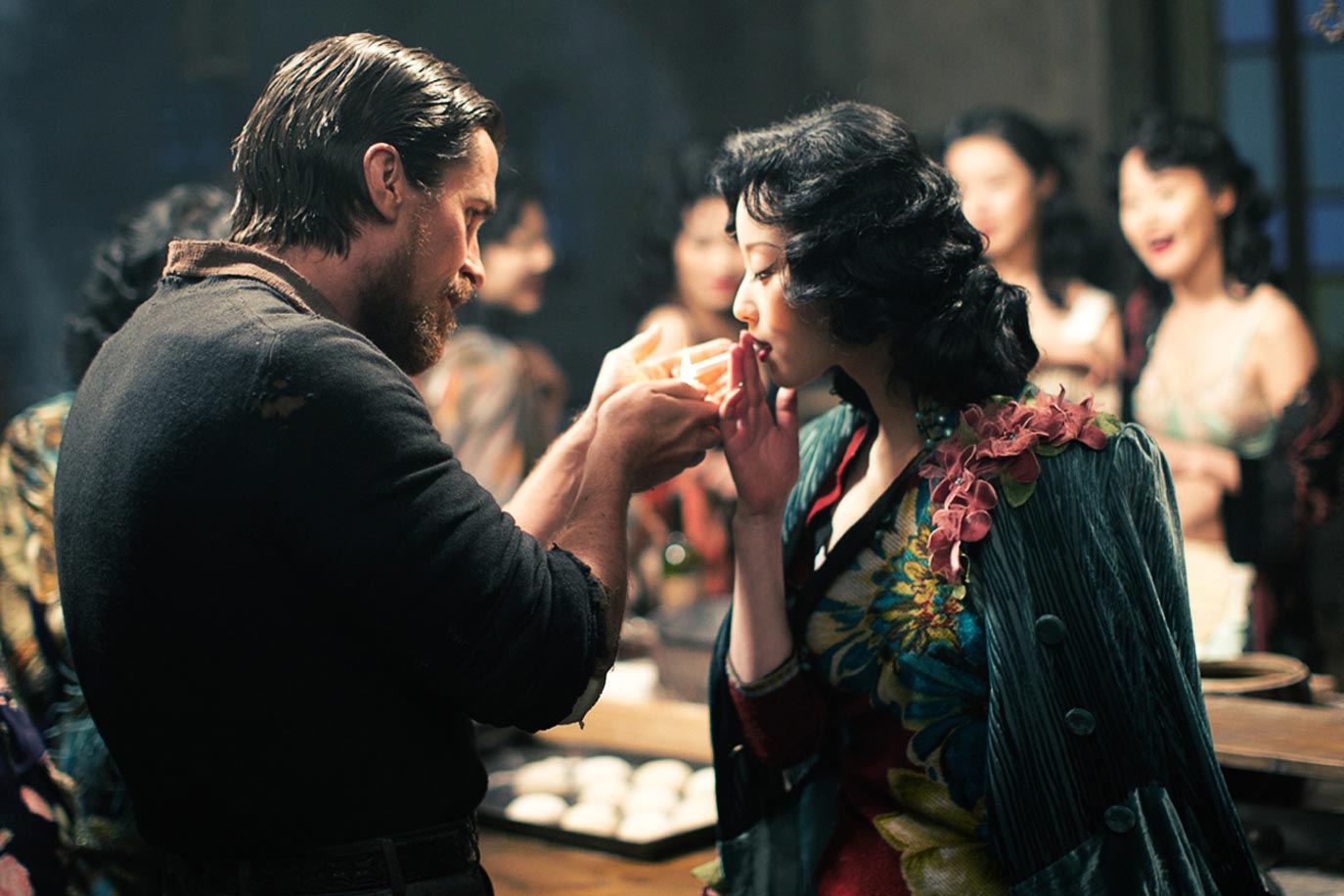“The Flowers of War” is a Chinese war drama based on the Nanjing Massacre during the Second Sino-Japanese War. The stylish and sometimes brutal depiction of the scarring conflict and atrocities was made with a budget of almost $100 million making it the most expensive Chinese film ever made. Director Zhang Yimou’s respectful but straightforward approach to the story gives it quite a powerful punch even though it employs a few conventions that we’ve seen in several other films.
Christian Bale plays John Miller, a boozing American mortician who is hired to bury a priest at a convent in war-ravaged Nanjing. He arrives as the Japanese army is storming the streets catching and executing civilians and the small pockets of the Chinese forces struggling to survive. He narrowly makes it to the convent and performs his duties but we quickly find out that he’s a pretty despicable man. After being told they can’t pay him, he begins rummaging through the church in search of money and later gets drunk after finding the communion wine. But the horrors of the war outside the walls of the church find their way in which sets the table for John’s own personal salvation. He’s faced with the choice of a self-seeking escape, leaving everyone else behind or staying and doing everything in his power to protect and save the young girls of the convent.
John isn’t as shallow of a character as the material occasionally makes him look. Sure, he’s a drunken self-centered loser whose redemption is inevitable, but we later find out that there is more to him and his past. We understand his connection to the girls and why he feels the need to stay and protect them. He sees it as his chance to do something right for a change but it also touches on some deep inner feelings that are connected to his past. I really enjoyed watching Bale transform his character on-screen. Bale’s performance is strong, both as the obnoxious jerk and as the new man he becomes. I also bought into his relationship with the girls despite a few inexperienced performances from the young actresses.
Things grow more complicated at the convent when a group of colorful prostitutes bust into the church seeking shelter from the rape and murder going on throughout the city at the hands of the Japanese soldiers. John gives them refuge in the cellar. But the young girls from the convent don’t like them and the prostitutes are almost as self-seeking as John is at first. But we also see the relationship between the two groups go in several different directions which gives us some of the film’s more moving moments. Much like John, the prostitutes aren’t as shallow as they seem and in many ways they seek the same personal redemption that he does. Ni Ni gives a very good performance as Yu Mo, the leader of the prostitutes for lack of a better word. She’s a tough and confident woman who instantly catches John’s eye. One of the remarkable things about Ni Ni is that this is her first film role. Director Yimou wanted someone from Nanjing and Ni Ni won the part.
Yimou’s direction is so good and his visual style permeates every scene. Not only has he directed 20 films but he’s also been involved in cinematography and that certainly contributes to his cleverness with the camera and impressive staging of shots. He also creates a believable gritty and bloody war-torn environment. The shells of the city’s buildings,the debris and rubble, and the gruesome images of corpses lined along the streets all contribute to convey the magnitude of the carnage and destruction to the audience. Yimou also doesn’t shy away from showing the savagery of the Japanese soldiers. There is a brutal rape scene that is truly hard to watch and an attempted mass rape scene that is equally difficult. Yimou kept everything in bounds but it still left me unnerved and shaken. There are also several scenes of war violence that are very well served by his stylistic flare. Now I did feel there were a couple of scenes where the bloodshed was unquestionably gratuitous, but overall it felt perfectly in place.
While the war and the atrocities are a big part of this movie, it’s not the main focus. Yimou has said that love, salvation, and sacrifice were some of the key things he wanted audiences to take from the film. The war was the backdrop which simply revealed the evil side of humanity. But there is good and there is love and that’s what we get as the story unfolds. The story runs us through an emotional wringer and there are some gut punches along the way. While I concede that there are moments that feel a little contrived and the dialogue sometimes seems artificial and strictly intended to evoke emotion from the viewer, I have to say that the movie worked for me. I recognize its flaws, but I was drawn into this rather unfamiliar territory for me and the interesting dynamics and high stakes kept me enthralled throughout.
Roger Ebert’s biggest complaint about the movie seemed to be that the story revolved around a white American as the priest. He ends his review by asking “Can you think of any reason the character John Miller is needed to tell his story? Was any consideration given to the possibility of a Chinese priest? Would that be asking for too much?”. I found this to be one of the oddest criticisms hurled at a film in a while. First, the Chinese filmmaking team had a good grasp on the story they wanted to tell and their film was based on a novel which set many of the characters up for them. Second, the fact that John was an American gave him a limited immunity from the Japanese aggression. We see this play a big role in the film on several occasions. So Ebert’s criticism is either grounded in something else or he simply overlooked these key facts.
I can see where this film could be too gruesome for some and too depressing for others. I can see arguments against the movie’s occasional gratuitous violence, the few instances of sub-par acting particularly from the children, and some of the movie’s emotional moments that seem generated solely to get a response from the audience. But I have to admit, while these issues kept “The Flowers of War” from being a great, great movie, they didn’t hinder it from being a very good film that touched me on numerous occasions. The stylistic visuals, Bale’s strong lead performance, and the many heart-wrenching moments that I responded to help make this a very satisfying movie. It’s not easy to watch at times but it’s still good storytelling and one I would have no problem seeing again soon.





Great review, Keith. I’ve been meaning to see this in a while. That is an odd criticism indeed, I mean this is historical-based right, and Zhang Yimou wanted to tell the story this way so the complaint about the ‘white guy in a Chinese movie’ is rather silly. There was a similar complaint about Machine Gun Preacher too, as it’s based on a true-story about a white guy who turned to God which inspired him to start an orphanage in Africa. I mean that’s the facts but the critics seems put-off by the whole racial issue instead of focusing on the humanity of the story.
In any case, I’m a bit worried about the amount of violence, but then again, as I came from a country that was violated brutally by the Japanese, no doubt the vicious attacks was not an exaggeration. I’d just have to have a big blanket to cover my eyes when I watch this, and a big box of tissues!
Thanks Ruth! It was much better than I thought it would be. Quite powerful and moving. As I alluded to, it took me to pretty unfamiliar territory which I really liked as well.
Knowing how you feel about graphic violence, that is one thing to consider. It’s certainly not the driving force of the movie but it’s still a powerful force. Most of the times it’s done as an effective method of depicting what it was like then. But there are a few scenes that are just bloody stylized action shots. Not many though.